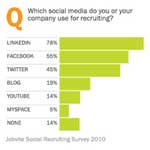When you use social networking such as Twitter and Facebook, the very use of those tools implies that you want to connect socially with friends and business partners through social media platforms. But, how can you keep the worlds of business and socializing separate, especially if you work in the healthcare field? While these platforms can promote services as well as connect with patients, how far can healthcare workers take these platforms, and what do they need to know?
How Employers See Social Media
 One way to define how to use social media is to learn how employers view these tools. Jobvite published a report this year that shows how recruiting professional use social media to find and vet candidates for jobs. This report reveals two things: That social media has become a viable resource for finding candidates and jobs, and that how you use social media could affect your ability to obtain or keep a job.
One way to define how to use social media is to learn how employers view these tools. Jobvite published a report this year that shows how recruiting professional use social media to find and vet candidates for jobs. This report reveals two things: That social media has become a viable resource for finding candidates and jobs, and that how you use social media could affect your ability to obtain or keep a job.
Recruiters, it is shown, are using social networking sites far more today than they are using traditional methods for hiring. The social media sites that are important to them include the following:
- LinkedIn: 78 percent
- Facebook: 55 percent
- Twitter: 45 percent
- Blog: 19 percent
- YouTube: 14 percent
- MySpace: 5 percent
- Other (None): 14 percent
This report might simplify the social networking maze than any other tool, as it points to LinkedIn as the professional networking tool and to MySpace as almost irrevelent for professional networking.
This report does not answer the question as to whether Facebook is professional or social (as in friends and family), but any Facebook user knows that there are two ways to present yourself in that medium — as a social user with friends and family and as a professional through Facebook Pages.
How Mayo Clinic Uses Social Media
 While many patient privacy issues are addressed with HIPAA (Health Insurance Portability and Accountability Act), it appears this legislation has not extended to how medical students use social media. Age is a concern here, as many medical students and young healthcare professionals are far more in tune with social networking than their elders. Still, a recent study shows that 60 percent of U.S. medical students post unprofessional content online.
While many patient privacy issues are addressed with HIPAA (Health Insurance Portability and Accountability Act), it appears this legislation has not extended to how medical students use social media. Age is a concern here, as many medical students and young healthcare professionals are far more in tune with social networking than their elders. Still, a recent study shows that 60 percent of U.S. medical students post unprofessional content online.
In a professional situation, the Mayo Clinic provides one example of how to use social networking tools. Lee Aase is the clinic’s manager for syndication and social media, and they began their campaign with a podcast in September 2005. From there, the Mayo Clinic began to build blogs addressing various topics and uses Twitter as a means of broadcasting new content on their blogs and video pages.
The Mayo Clinic is concerned about HIPAA, but patients are legally entitled to post information on their own conditions. To safeguard their credibility, legal stance and the patients’ privacies, the clinic needs to get a consent form for interviews with patients about their stories. To protect patients, the Mayo Clinic reserves the right to remove personal contact information from any interaction on their social media platforms.
While a professional healthcare institution with a manager for syndication and social media – and probably an attorney who is schooled in privacy issues in the wings – might show the way on how to use social media responsibly, how should an individual use social networking in a personal situation or in a smaller healthcare routine?
Some Tips on Using Social Media for Healthcare
 If you plan to use social media, or if you already use Twitter, LinkedIn, Facebook and YouTube, you might heed some of the following tips for your own credibility and job insurance:
If you plan to use social media, or if you already use Twitter, LinkedIn, Facebook and YouTube, you might heed some of the following tips for your own credibility and job insurance:
- Learn the platforms: Learn how to use each social media tool to your advantage, which means learning how to use privacy controls and other customizations.
- Keep professional and social relationships separate: By dividing social and business lives, a healthcare professional can maintain a professional demeanor on one hand and socialize with friends and family on the other. It is not appropriate to “friend” patients on Facebook or to follow them on Twitter.
- Watch your associations: You may want to connect with a patient on a blog, but you may not want to connect with that patient on Facebook or LinkedIn. On the other hand, you don’t want a friend with an offensive user name to appear on your list of people you follow on Twitter, unless you Tweet anonymously (possible by not revealing your real name, but a user name when registering).
- Keep politics and religion quiet: Unless you plan to be a journalist or an activist, it is best to keep those two topics in the personal realm, rather than the business realm. Activism, however, is up to you — if you, as a healthcare professional — want to campaign for clean water, then use your professionalism to temper your activism.
- Use social networking to say “Thank you” and to set up meetings in person: This Mashable article explains that social networking provides the perfect medium to extend your hand in business situations appropriately.
- Keep comments civil and don’t use social media while under the influence: The article about medical students explains succinctly how these comments can lead to expulsion from school — and in professional situations may lead to job loss or loss of clients.
Conclusion
 If you want to connect professionally, used LinkedIn to find your peers and to network among other health professionals. If you want to socialize, use what your friends and family members use. Facebook seems more popular than MySpace, but in both cases you need to watch privacy issues and check your home page constantly while logged out to make sure you are not revealing any information you want to keep confidential.
If you want to connect professionally, used LinkedIn to find your peers and to network among other health professionals. If you want to socialize, use what your friends and family members use. Facebook seems more popular than MySpace, but in both cases you need to watch privacy issues and check your home page constantly while logged out to make sure you are not revealing any information you want to keep confidential.
Twitter is an amazing tool for broadcasting, but it takes time to build up a following. If you want to vet who to follow on Twitter, use Listorious, or use search: site:twitter.com/*/keyword to search for Twitter Lists containing your keyword on Google Search. You can also search for multiple words by putting a hyphen between them, such as site:twitter.com/*/healthcare-pediatrics. Be sure to avoid any spaces in your search (via Tweetsmarter).
Although social media is not conducted as a regular class in most medical or healthcare courses, plenty of information is available online on how to use social media tools in a professional manner. Read blogs such as Mashable or ones focused on healthcare such as Social Hospital to learn more about content management. If you apply HIPAA to those constructs, you may find that social media can provide a wonderful extension to your healthcare services, much like positive word-of-mouth testimonies.
Did you enjoy this article?

